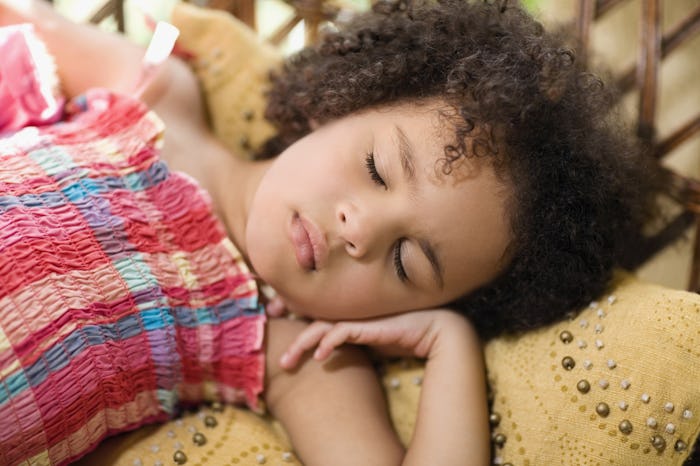When you have a newborn, sleep is a pretty major part of their daily routine. In the beginning, babies may only interrupt their snooze sessions for feedings, diaper changes, or to crack a tiny toothless smile at Mom and Dad. But as they get older, kids don't nap nearly as often. Nap time becomes a precious window of time that parents treasure as time to catch up on housework, phone calls, and even their own sleep. But if you're finding that getting your child to nap is becoming a complicated, choreographed process, you may be wondering at what age can your child stop napping?
As mentioned on Today's Parent, nap time is not just about giving parents a quiet house. There's some pretty major learning, memory, and growth development happening during while your child is catching those Zs. So when do those "learning opportunities" fade away? Dr. Sears wrote in Parenting that between six months to one year of age, most babies take naps in the morning and afternoon, and drop down to one afternoon nap by age two or three.
Additionally, Sears pointed out that many kids begin to eliminate naps from their routine completely around age four. Why is that? Well, an article in Parents mentioned that there are still benefits to preschoolers taking naps, including a a better attention span and the ability to sleep more peacefully at night.
But as you already know, every kid is different and not all are created to nap equally. Dr. Sears suggests, parents should watch their child's behavior rather than their age to determine whether or not naps are still needed. If you find that going without a nap makes him cranky in the late afternoon, he could probably still benefit from an afternoon snooze.
Activity levels can also impact whether or not your child needs to nap. Things like school, sports, or even a long day at the park can make otherwise napless kids want to go down for a short rest. But if your child simply refuses to nap, pediatric sleep expert Judith Owens suggested offering your child some quiet time with a book or a favorite stuffed animal to allow their brains a chance to rest.
If you're still on the fence, and thinking that an afternoon nap might mess up your bedtime flow with your preschooler, you can rest easy. According to Parents, kids who don't have some kind of rest time in the afternoon can instead become overstimulated, and may have a hard time getting off to sleep at night. So watch your child's behavior, and make the best decision for your family. A little quiet time during the day, can make everyone a lot happier.
